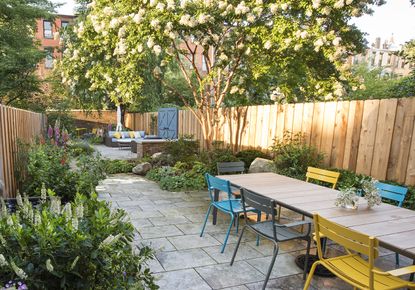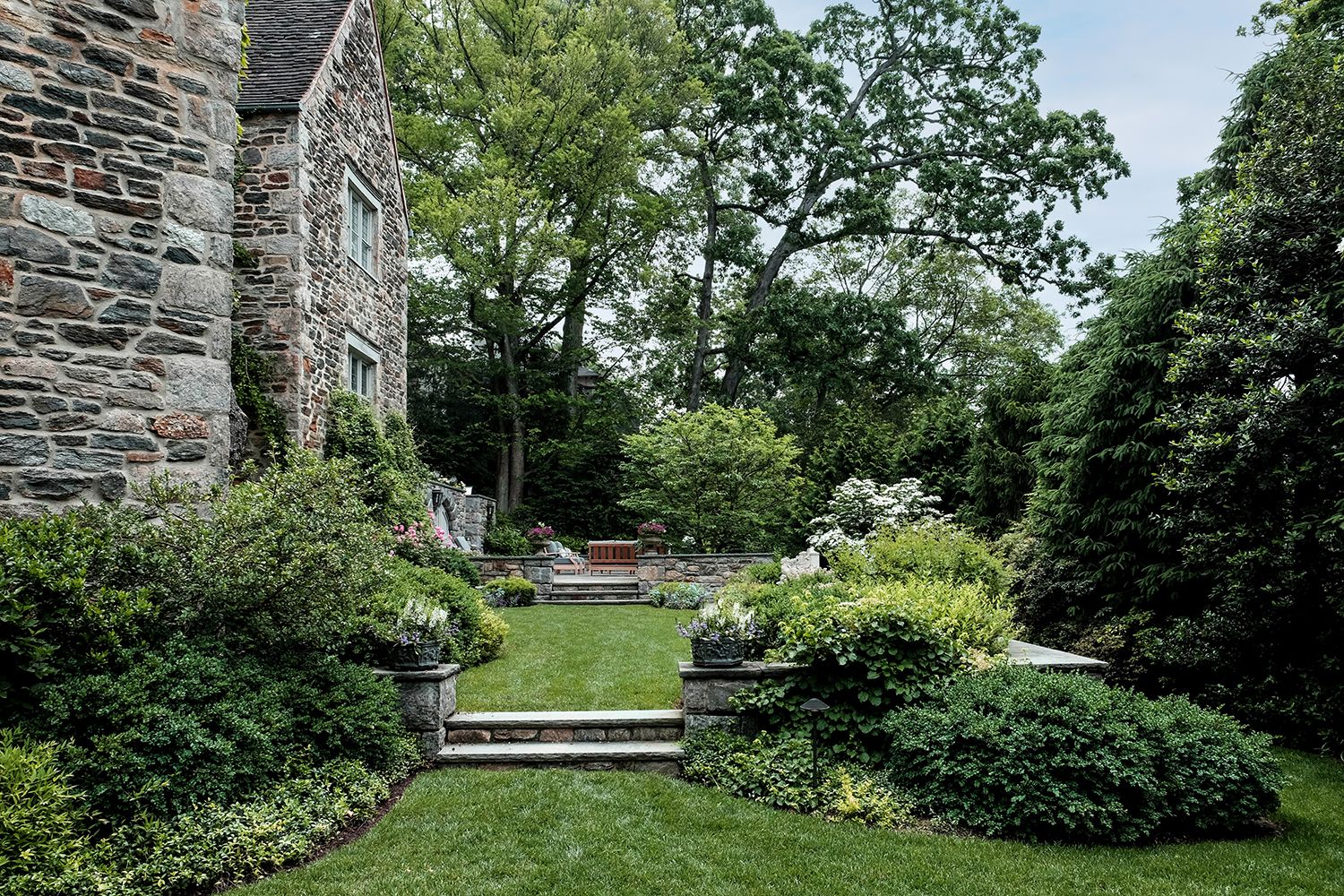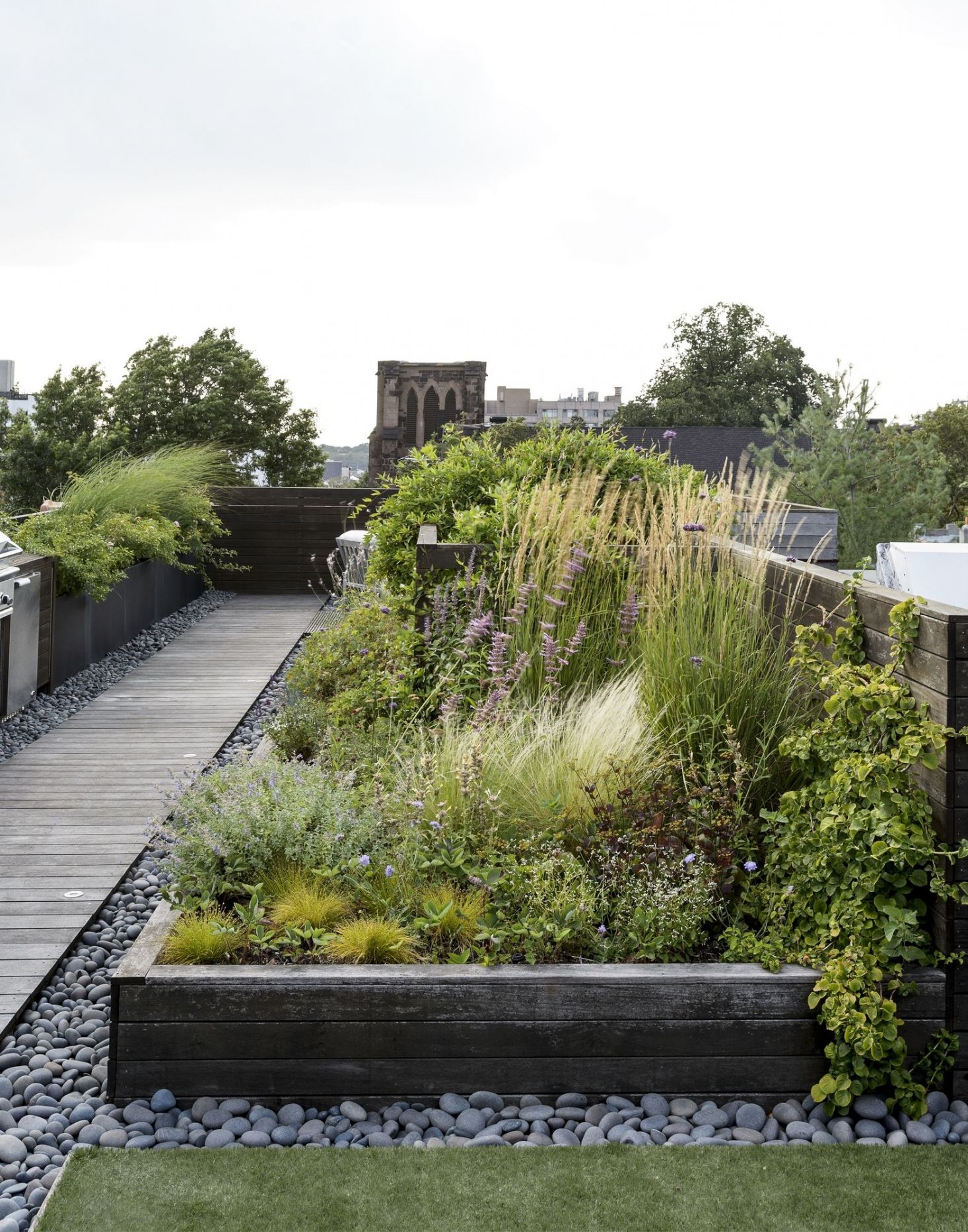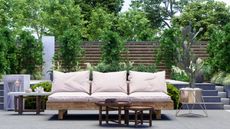Narrow garden ideas - top designers on 10 ways to plan the perfect rooftop terrace or backyard, even in a slim space
America's top landscapers share their narrow garden ideas, proving you can create a haven even in a tight, urban space

Narrow garden ideas can apply to anyone who doesn't have a sprawling Hamptons estate. As whether you have a huge plot, or more of a sliver of green space squeezed in between your neighbors, slim outdoor spaces are surprisingly common.
Thankfully there are plentiful modern garden ideas focused on diminishing the “corridor effect”. From creating vertical gardens to landscaping different levels to disrupting the sight lines with zones, there are many approaches to take.
But before you dive in with the diggers, try to live with the space first so that you can get to know it slowly, advises Julie Farris, a New York City-based garden designer and founder of XS Space. “Then move onto diagrams so that you can organize and prioritize, and then you might want to stake a temporary layout and see how it sits,” she says.
The main thing, Julie adds, is “to try not to feel intimidated by the process - some of the most beautiful and poetic spaces in nature are not designed, so be assured that unintended outcomes can sometimes work out great, too.”
Narrow garden ideas
1. Alter the proportions with tall evergreens

Brooklyn roof terrace designed by Amber Freda
Urban gardening ideas often have to adapt away from creating carpets of greenery. So in your outdoor space, why not consider a wall of foliage instead?
“For this narrow roof deck on top of a Brooklyn townhouse, we used columnar arborvitaes along the left hand side of the walkway,” says the New York City-based landscape designer Amber Freda. “They have an upright, narrow habit that does not impede on the roof deck space or make it feel overly crowded.”
These taller evergreens also offer privacy from an adjacent roof, she explains, and do a lovely job of referencing the city buildings in the background. In front of the arborvitae, Amber added creeping Jenny, purple petunias and Mexican feather grasses, in order to give the planters a more lush-looking appearance.
Opposite those planters, she has followed one of our favorite garden trends for blowsy cottage-like blooms. A mix of plants are used, including Tardiva Hydrangeas and catmint, and evergreens like Boxwoods and Junipers, along with some wispy-looking Maiden grasses for texture. The idea was so that the garden resembled "something between an English garden and a meadow.”
2. Go minimal to maximize the illusion of space

Garden in West Village, NYC, designed by Julie Farris
“Less really is more,” says the garden designer Julie Farris of XS Space, for whom the majority of her work entails designing narrow New York City townhouse gardens. “So it’s all about maximization of space, both in terms of form and how they function.”
But maximization doesn’t mean adding more stuff, she explains. “In fact, in these types of spaces it’s really about adding less - and sometimes removing existing details - because elements like paths and plants become magnified when placed in narrow spaces.”
When it comes to optimizing a narrow garden, Julie is hugely inspired by ancient Japanese garden ideas, which, she says, “implement the technique of ‘foreshortening’ - creating the feeling of additional space by defining the foreground and background within a frame.”
It’s a technique that she has found to be very helpful in Manhattan, her frame here being a very clean and graphic wooden-slatted fence, while the spherical planters in the garden draw the eye to the two different focal points, which sit at slightly different levels. The pale limestone paving also helps to create a sense of expanse.
3. Create a multi-level landscape retreat to break up the perspective

Before the acclaimed landscape architect Renée Byers got to work, this garden adjoining a distinguished, 1928 Jacobethan Revival house by the renowned architect Lewis Bowman yawned out in one skinny 26-foot long stretch back to the oak and katsura trees at the rear.
Renée broke it up by creating a progression of spaces all at differing levels, so “each level is a separate experience,” she explains, and, “each garden room is linked to the next with grade changes”.
At the back, just in sight, is a formal paved garden for cocktails - definitely one to add into our garden bar ideas - while the middle parterre is left quite clear in order to preserve the sight lines.
On the far right of this award-winning garden, where there is a steep drop-off down to the street, Renée planted high but narrow trees - a mix of hollies and hybrid Norway spruces. “You want a more narrow tree so that it doesn’t take up garden space,” she explains. And she squeezed in a second pathway just in front of these trees, so that “you can make a promenade through the whole garden and experience a more wild environment.”
4. Reflect inner style outside

Design by Judy Kameon
The garden of New York architect/interior designer Bill Georgis’s seaside home in La Jolla, California is just about four meters wide, and sits sandwiched between the house and the adjacent steep hillside.
His long-term collaborator and celebrated landscape architect, Judy Kameon, founder of Elysian Landscapes - who has designed for the likes of Isabel Marant, Balenciaga and Mike D of the Beastie Boys - has created a lush space, abundant with palms and succulents. “The garden runs the length of the house - the challenges of the site inspired the design,” Judy explains.
The solution, she says, was to create “a series of outdoor spaces that loosely corresponded in function and mood to the adjacent indoor rooms”. For example, just outside the interior kitchen and dining area is an outdoor grill and dining space, and there are intimate nooks off the living room, library and bedroom, which are embedded within lush planting - spaces that are used for both entertaining and daily life. Kameon even mirrored Georgis’ rich interior palette by planting Mediterranean and subtropical shrubs, perennials and succulents in shades of gold, silver and bronze.
A diverse range of plant species, like Junipers, Cordylines, Pindo Palms, Agaves and Pittosporum are densely layered throughout the garden. The verdant outlook breaks up any long lines, while the gravel - a favorite of low maintenance garden ideas - lends a sense of spaciousness, and strikes a balance between nature and urbanity.
5. Elevate the vertical space

Design by Amber Freda
Who says garden border ideas have to be contained to ground level? When city space is limited, creative gardening is called for. In this narrow backyard patio space in Manhattan, Amber Freda needed to fit plants into the area, while still leaving room for seating solutions.
“Rather than putting planters on the ground, which would have made the space feel more congested, we built window box-size planters into the top of the fence,” she explains. The plantings include boxwoods and sweetflag grasses, which also have low-voltage up-lights placed between them, “for a beautiful nighttime ambience”.
She also designed bench seating into the wooden wall, which is made of Ipe wood. “The upper slats in the fencing allow more sunlight to come through,” Amber explains, “as well as a view of the neighbor’s lush foliage behind the fence.” Take what you can, if it’s not hurting anyone.
6. Make a virtue of the length

Design by Julie Farris
“In a narrow garden, it’s important to consider both visual and physical movement through the space,” explains Julie Farris. “How one moves through a garden is really important to how you actually feel in the garden.”
In this design - Julie’s own Brooklyn townhouse rooftop - the walkway becomes the “spine or organizing element” she says, “and creates a feeling of length and prospect in either direction”. As illustrated here, it can actually work to draw attention to the length of your garden, especially when, as Julie notes, “The narrow-ness of the walkway is offset by the openness to the sky and the views beyond east to west and out onto the Manhattan skyline.”
Her beach-y walkway connects to two lounge areas that have been designed to work for family time now as well as when the kids are older, when teenagers want to hang out with their friends, and the adults with theirs. For the “very simple, low maintenance garden”, Julie's roof garden ideas centered around a “strong and enduring style” that would weather well: a varied mix of perennials and grasses that, she says, love sun and can withstand pretty tough conditions - great intel for anyone wondering how to choose plants for their modern garden.
Jasmine, wild geraniums, roses, lavender, Coreopsis, Calamagrostis, Nasella, Russian Sage, Agastache, Echinacea, Alliums, Gaura, Yarrow, and Climbing Hydrangea all feature here.
7. Create a canopy of foliage

With just 10 ft of garden width to play with, the landscape designer Margie Grace, founder and design director of Santa Barbara-based gracedesignassociates.com, had various challenges to address in this downtown Santa Barbara residence.
“We had to create a two-person-wide walkway as well as provide screening from the neighboring two-story house,” Margie says. In addition, the clients asked for as much on-site food production as possible, with figs being one of their favorite fruits. Margie’s solution? This fabulous “allée” of figs, trained on a series of metal arches.
Not into figs but want other fruit and modern vegetable garden ideas? “Many other woody plants and vines make great candidates,” says Margie. “Grapes are a classic to train over an arbor or pergola - they can cover a vast area or be trained to small structures.”
Lemon also works well, though it’s a slow grower. You could also do it with Kiwi fruit and Passionfruit, but, Margie notes, “These vigorous growers require a really strong structure and heavy seasonal pruning.” To get it right visually, make sure your plant doesn’t get out of hand, advises Margie. “Don’t let it turn into a blob; it should always read as architecture.”
8. Divide and conquer a narrow space

Design by Beth Mullins of Growsgreen Landscape Design
“I find that gardens with just one central area surrounded by perimeter plantings tend to waste space,” says the landscape designer Beth Mullins, founder of San Francisco-based practice Growsgreen Landscape Design. Plus, “It only leaves you with one area for hanging out.”
The more places you have for people to gather, she says, the larger the garden feels. Here, Beth created a “journey through the garden visually and experientially”, by determining the flow from space to space, and, she adds, “by thinking about what views to the next space would pull you through”.
The steps from the house open up to a deck with a large bench that can seat many or give the space for just one or two to really chill; eating takes place at the back of the garden, where there is also room for more intimate conversations under the palms.
Beth kept the tones “timeless but interesting”, so that each material highlights the textures nearby: “I like that play on texture that happens with hardscaping and softscaping.” The complementary tones serve to create a cohesive whole that offers different zones without looking fragmented.
9. Disrupt the straight line with foliage

A garden in Brooklyn, NYC, designed by Todd Haiman
Narrow garden ideas often have to contend with a space that is a bit like a “railroad flat where one room leads to the next”, observes the New York-based landscape designer Todd Haiman.
That straight line that runs through the garden needs to be broken up, he says, an approach that is also often needed for courtyard garden ideas. His design solution was to “create a sensory and experiential journey through multiple spaces, whereby the visitor has larger and smaller spaces, and wider and tighter paths, which tend to affect the pace and speed at which they move through the space.”
Originally three trees stood in a row on one side of the garden, though when one needed to be removed due to disease, Todd took the opportunity to create a “circuitous path to meander through” by planting a Cornus Florida on the opposite side of the garden. As you move further from the house, the plants become less formal, with Rhododendron ’Nova Zembler’ hedges to separate the garden rooms.
Around the dining area, he planted yews and sweet pepperbush to create a green foundation, and in various spots throughout the garden, he planted woodvamp, a trained vine intended to climb the cedar fence, which will eventually break up the continuous line of the fence down the garden.
10. Pack a narrow space with plants

Big gardens can still present challenges when it comes to narrow proportions. Although this intimate walled kitchen garden is part of a larger Hamptons estate, the landscape architect Renée Byers had only a very narrow planting space to work with. The new stone wall was built to protect the house from the driveway, and at the same time created a screened porch on the side of the house.
To deal with those corridor-like proportions, Renée “packed it with plants,” she says. “I used jasmine and rosemary so there’s an incredible smell when you open the doors, New Dawn and Sea Foam roses, petunias, Heuchera Obsidian and Scavola… I wanted to make it look really profligate and permanent.”
Along with a freestanding sun-bleached teak bench, the abundance of greenery “breaks up the long wall when you‘re looking out onto the kitchen garden”, she says. And she positioned the outdoor grill conveniently close to the house, but built it into the new wall, “so that you don’t have to be staring at it all the time,” she explains.
Be The First To Know
The Livingetc newsletter is your shortcut to the now and the next in home design. Subscribe today to receive a stunning free 200-page book of the best homes from around the world.
Fleur Britten is a well-respected journalist who for years was the Senior Features Editor at Sunday Times Style. She is known as one of the smartest lifestyle journalists around, revered for being able to decode trends and report on new zeitgeists as they happen. She now writes for the Telegraph, Livingetc, Vogue, The Times, Harper's Bazaar and the Guardian.
-
 How to Organize your Bathroom for a Better Morning Routine — 6 Steps for a Seamless Start to the Day
How to Organize your Bathroom for a Better Morning Routine — 6 Steps for a Seamless Start to the DayThe ease of your morning routine can have a huge influence over the rest of the day, so make sure you optimize you space for a stress-free start to the day
By Lilith Hudson Published
-
 5 Trees You Should Prune in Your Backyard in February — 'It Makes Much Sense to Cut These Ones Back Now'
5 Trees You Should Prune in Your Backyard in February — 'It Makes Much Sense to Cut These Ones Back Now'If you think pruning trees is best left to spring, think again. These trees all could use some cutting back now for several very important reasons
By Hugh Metcalf Published

